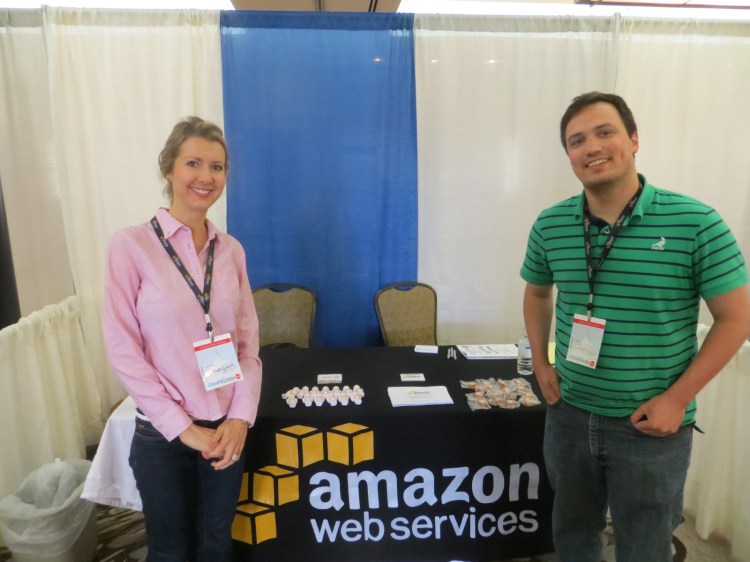It used to be that Microsoft could always undercut a startup by copying its services and then selling them. Now, increasingly, leading cloud provider Amazon Web Services is the one to watch out for.
Today, Amazon rolled out products that compete with services from startups that use Amazon’s cloud infrastructure: the Zocalo file-sharing service and new mobile-focused application services. Dropbox and Parse rely at least partly on Amazon to deliver their versions of those respective services.
Amazon has done this sort of encroaching on startups’ existing services in the past. Last year it introduced the Simple Notification Service for mobile push notifications, while customer Urban Airship had similar features. But now Amazon has outdone itself, barreling into two new markets in one day.
“I think it’s reached a high point,” Sravish Sridhar, the founder and chief executive of mobile-backend-as-a-service (MBaaS) provider Kinvey, said in an interview with VentureBeat. “Amazon’s entry into MBaaS as well as the document sharing and collaboration market has shown that, you know, it’s reached a high point where they’ve competed now with a variety of platform vendors, and the next set of big platforms should be worried about it.”
Today’s moves could make startups think twice about whether they want to build on Amazon’s cloud infrastructure as competitors like Google come up quickly. They might turn to Google, IBM, or other public clouds instead.
But it might be early for the impact to be fully clear. For now, companies with mobile backend and file-sharing capabilities don’t seem to be scared out of their skeletons.
While Kinvey’s own website runs on Amazon infrastructure, and while Kinvey enables developers to build and run mobile applications using highly abstracted Amazon computing power, Kinvey focuses on enterprise business. And it supports other public clouds and enables private-cloud deployments, Sridhar said.
“I’m less worried, but if I was completely beholden to AWS, then that’s a different matter,” he said.
KidoZen, another mobile app platform, can also work on Amazon as well as other cloud infrastructure. And it can integrate with enterprise favorites like Microsoft SharePoint software, Oracle databases, and Siebel customer-relationship management software.
“I don’t necessarily have fear at this point,” KidoZen cofounder and chief executive Jesus Rodriguez told VentureBeat. “I think if you’re building on an infrastructure like Amazon and you’re not accounting for that risk, it seems like you’re somewhat naive.”
What’s more, KidoZen provides tools that Amazon doesn’t (yet). It has data-virtualization and data-management capabilities, among other features.
Both Rodriguez and Sridhar pointed to Facebook-owned Parse as the company in a squeeze. It runs atop AWS.
Parse is “remaining on AWS for the time being,” a spokeswoman wrote in an email to VentureBeat. That option, of course, leaves open the possibility of a future migration to Facebook’s own extensive infrastructure, just as Instagram has moved from Amazon to Facebook, but the position at Parse is basically the same as it was a year ago. The statement doesn’t suggest urgency.
Dropbox, for its part, would not comment for this article.
So far, then, the competitive threat could be real in the future, but it’s not quite having real effects at this point.
Look to Amazon cloud customer Netflix, which streams video just as Amazon does.
“Amazon already competes with Netflix, and so far Netflix is not publicly stated that they are going anywhere else,” cloud analyst Larry Carvalho wrote in an email to VentureBeat. “As long as there is a large enough pie to go around and Amazon maintains the lead in cloud services, this may be acceptable to their large customers like Dropbox. Coopetition already exists in existing technology companies like IBM, HP, Microsoft and Oracle — it’s just expanding into the cloud space.”
And anyway, as Amazon sees hot trends and enters more and more markets, it could get stretched thinner and thinner. The result could be a long list of products that can’t keep up with existing competitors.
“I think the AWS team is going to make some shoddy products if they don’t focus over time,” Suhail Doshi, cofounder and chief executive of mobile-analytics company Mixpanel, told VentureBeat in an instant message. “It’ll be a death by a thousand cuts. They only have so many engineers and they can only do so many projects. Every company has to prioritize.”


